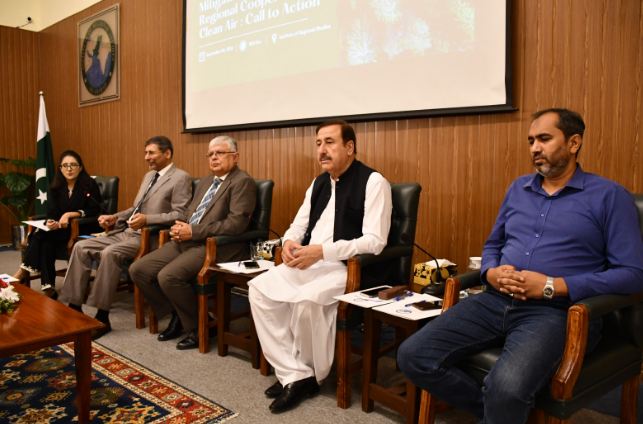ISLAMABAD, SEPT 7: /DNA/ – The Institute of Regional Studies (IRS), Islamabad, hosted a seminar on ‘Mitigation Strategies and Regional Collaboration for Clean Air: Call to Action,’ in recognition of the International Day of Clean Air for Blue Skies-2024. The seminar concluded with an urgent call for collective action for stronger regional cooperation, increased public awareness, and implementation of sustainable policies to protect air quality and public health.
The event featured notable climate experts including Dr. Eric Zusman, Research Director at the Institute for Global Environmental Strategies (IGES), Japan, Mr. Zia Ul Islam, former Director, of Pakistan Environmental Protection Agency (Pak-EPA), Dr. Muhammad Bashir Khan, Member (Technical), Environmental Tribunal, and Engr. Asad Mahmood, Energy and Climate Expert.
Opening the discussion, Ambassador Jauhar Saleem, President of the IRS, remarked that air pollution was the world’s largest environmental health risk, contributing to 8.1 million premature deaths annually. He indicated major urban areas of the world that have become non-livable because of poor air quality He stressed the need to invest in clean air which he called essentially an investment in public health that could help reduce disease burdens and save lives, he added.
Dr. Eric Zusman, underscored the interlinked nature of air pollution and climate change in Asia, emphasizing the urgent need for integrated solutions to address those crises effectively. He suggested technological solutions with the potential to significantly improve air quality and mitigate climate change across the region. He also pointed out several challenges to implementing those solutions, including technological, economic, institutional, and social barriers. He also highlighted the importance of overcoming these challenges, particularly in addressing open burning—a critical issue affecting air quality and climate in the region.
Elaborating on the challenges in improving air quality, Mr. Zia Ul Islam, said that financial constraints, inadequate enforcement of existing laws, and limited capacity of regulating agencies were the key barrier to deal with air pollution. To address this, he proposed strategic solutions, such as improved stakeholder coordination and stricter enforcement of existing laws, along with stringent air quality standards and control on the import of outdated technologies. Mr. Zia Ul Islam also highlighted the contribution of open burning in recycling industries and lead-based fuel and paints to air pollution and adverse health impacts.
Dr. Muhammad Bashir Khan underscored the technological gaps that hinder effective air quality management in the country. He emphasized the need to invest in monitoring systems for vehicular emissions and air quality and adopt air pollution control technologies. He also stressed the need to address the issue of lead-based fuel, improving air quality standards and transitioning to cleaner alternatives. He noted that regional cooperation was the only solution to control smog and transboundary air quality issues.
Engr. Asad Mahmood provided an overview of Pakistan’s air quality management efforts which included the adoption of zigzag brick kiln technology in Punjab. He emphasized investing in developing local technological solutions for each development sector and technology transfer to the global south. He noted that while global goals have evolved to increase climate action, Pakistan faces significant challenges due to budget limitations, outdated equipment, and inadequate technological facilities.
Dr. Anjum Rasheed, Head, Regional Climate Resilience Program at IRS, said there was a need to recognize air quality as a transboundary issue requiring collective efforts with the support of regional and international countries. The event was well attended by government officials, environmental experts, civil society leaders, researchers, and university students.

















